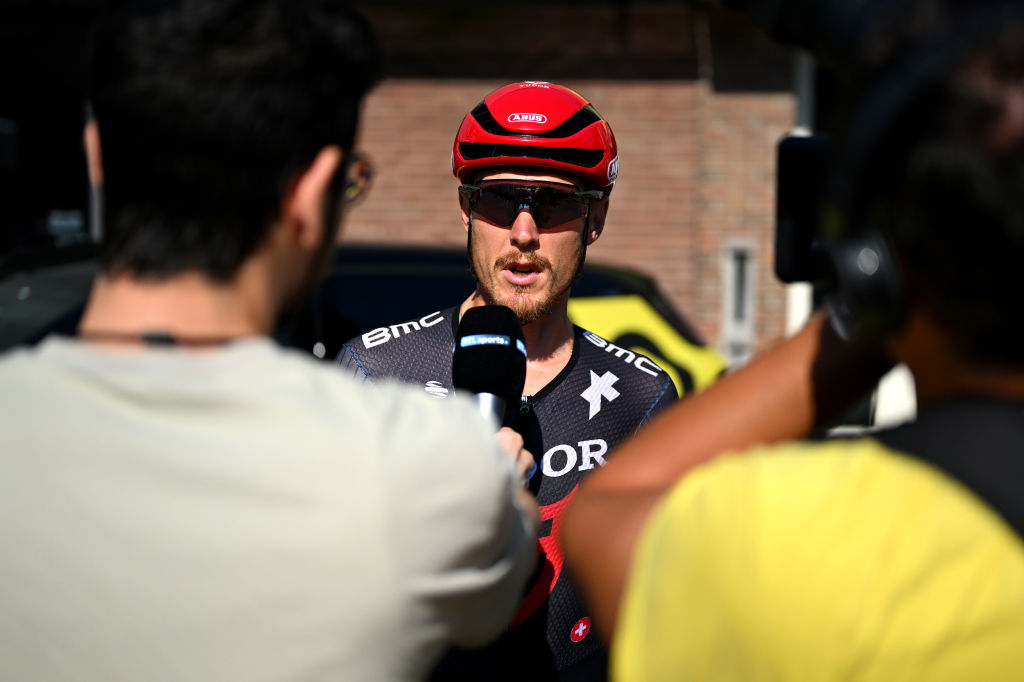As riders reveal their 2025 targets and speak about their hopes and ambitions, security is once more a sizzling matter and sparking debate. No one needs to endure severe harm nor see a repeat of the most important crashes that concerned Wout Van Aert at Dwars door Vlaanderen or Remco Evenepoel, Jonas Vingegaard and others at Itzulia Basque Nation in 2024.
Final week Van Aert steered that gear restrictions may very well be a solution to scale back speeds within the peloton by making it tougher for riders to maneuver up on quick descents. Among the most famous tools specialists within the sport have shunned that concept however Chris Froome steered limiting the development of know-how to assist enhance security.
Matteo Trentin (Tudor Professional Biking) is among the most revered voices within the peloton and at all times has a balanced, knowledgeable opinion, particularly concerning rider and race security. He needs a special, safer mindset.
“Gear restrictions could be a part of the answer, along with greater modifications,” Trentin informed Cyclingnews through the Tudor Professional Biking media day in Spain.
“We won’t take crashing without any consideration. Now we have to have that mindset and alter for the higher, as different sports activities have accomplished.
“We have to perceive that biking has modified. The speeds are increased however that is not truly the principle downside. The final stage of depth and competitiveness has elevated too. The place we as soon as had 15 riders going right into a nook, now we now have 50 riders going for it. In different key moments of massive races, riders aren’t dropped or lined out like they as soon as had been. That solely creates extra issues and desires extra consideration.”
Trentin referred to as for race organisers to assist make races safer by working with native authorities on route choice, to keep away from the risks of visitors ‘furnishings’ and poor highway design.
Trentin was in favour of circuit finishes, in order that riders may see the ultimate kilometres at the very least as soon as earlier than a high-speed dash end. He steered it will imply followers may additionally see the race a number of occasions and so the organisation may generate extra income and supply extra companies to followers.
He praised Paris-Roubaix organiser ASO for decreasing the risks of the Forest of Arenberg by including a chicane on the entrance, suggesting it as an excellent instance of change and improved security.
“If we have at all times used the identical strategy to a key a part of a race, perhaps that is not adequate anymore and we now have to alter issues to make sure security,” Trentin steered.
“The best way they modified the doorway to Forest of Arenberg in Paris-Roubaix after listening to the riders was an instance of that. There have been so many crashes there however now, because of the chicane, that hazard has been decreased.”
Trentin referred to as for extra dialogue between the riders, the Cyclistes Professionnels Associés (CPA) riders’ affiliation, race organisers and the UCI.
“I can keep in mind after we had been at all times on one aspect and the organisers had been on the opposite aspect,” Trentin stated of earlier disputes.
“The brand new SafeR challenge has introduced us collectively. The UCI can not put their head within the sand each time one thing occurs. They’ve realised they should act like all good governing physique, discover options to issues and produce everybody collectively.
“Athletes at all times wish to carry out. We work our asses off 12 months a 12 months to carry out. If I do not wish to race, it isn’t as a result of I am delicate or that I am searching for a confrontation, it is as a result of it isn’t secure and so not attainable.
“When athletes in any sport let you know one thing shouldn’t be secure, then everybody has to take heed to them.”

